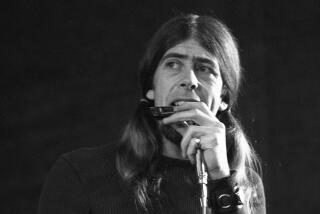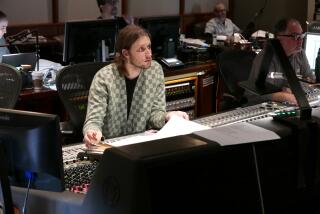The Sadly Neglected and Wholly Original Henry Cowell
John Cage, like Jean Cocteau or Jesus Christ, has a name our world knows; yet he might have remained unknown were it not for the now-unknown composer Henry Cowell. Indeed, Cowell’s pupils--Cage and Lou Harrison, George Gershwin and Burt Bacharach--have tended to outlive him, like so many of his more flamboyant colleagues (Carl Ruggles, Harry Partch, Edgar Varese, Ruth Crawford Seeger, George Antheil, Joseph Schillinger), partly because of his publicizing them. Now comes “Essential Cowell” to reinforce that notion. In 48 prose pieces, he discusses the music of almost everyone but himself--and of himself there is no value judgment, only technical explication.
But that accords with my own memories of him. I met Henry Cowell twice, both times at Virgil Thomson’s in the early 1960s when the three of us, plus Vladimir Ussachevsky, were plotting to revive (unsuccessfully) the journal New Music Edition. In the glare of Virgil’s rapid wit, Cowell struck me as self-effacing if willful, without much glamour. Had he been dulled by four years in prison? (In 1936, he went to San Quentin on a morals charge after having sex with a 17-year-old boy.) By his selfless efforts to support others? By encroaching disease? I never saw him again. He died in 1965.
Kyle Gann’s preface to “Essential Cowell” in itself is a perfect review. If he opens by declaring that “Henry Cowell was the one composer who seems to have come out of nowhere” and then contradicts this by saying that “Charles Ives used tone clusters years before Cowell,” one is merely reminded of what the novelist Raymond Radiguet said about artistic originality: “A true artist is born with a unique voice and cannot copy; so he has only to copy to prove his originality.”
Gann briefly outlines Cowell’s work and life, which began in 1897, stressing the man’s “utter refusal to be hemmed in by, or overly impressed with, the past.... Like Cage, Cowell could say, ‘I can’t understand why people are frightened by new ideas. I’m frightened of the old ones.’ ” Indeed, today, we remain the sole era in history in which the musical past takes precedence over the present--a performer playing Mozart can earn in one evening what a living composer may earn in five years.
Cowell also composed some of his best pieces in the most difficult of circumstances. At San Quentin, he claimed it was too noisy to write original music and that jailers thought his scores were “codes.” But he did manage to organize an inmates’ band and complete one of his most ravishing pieces, the “United Quartet.” In 1940, thanks largely to a campaign by Sidney Robertson (whom in 1941 he married), Cowell was released from his sentence into the custody of Percy Grainger, his “musical secretary.”
Not all of Cowell’s friends were sympathetic. Composer Charles Ives (1874-1951) never quite forgave his younger colleague. Cowell, meanwhile, promoted Ives’ work as avidly as Mendelssohn promoted Bach a century earlier, placing him forever on the international map--another proof, if proof were needed, that great artists aren’t necessarily great human beings, while many saints are second-rate artists. Art is unrelated to morality: It does not make us better, or even change us; art makes us more into what we already are by reminding us of all the things we know.
It was the late Dick Higgins, poet and actor, who had sewn together selections from Cowell’s huge catalog of prose, some of it mere wisps, some in-depth essays, all of it didactic and with little style but rich in content. The best of Cowell’s writings are from the 1930s, and are as much analyses as appreciations (for example, the writings on Stravinsky and on Virgil Thomson, in which he extols simplicity as radical).
“Essential Cowell” is divided into seven sections, ranging over his entire career, his encounters with other composers and countries. He relates a trip to Moscow in 1931 and the unexpected things that happen at concerts, partly due to unusual political situations. But Cowell believes that “it is largely because of the vital part that music plays in the lives of Russians. We here are apt to regard music as a mere amusement. To the Russian, music is a deeply ingrained necessity for the outpouring of his feelings.” Higgins notes that Cowell’s expressed abhorrence of communism is a reflection of McCarthyite hysteria still in the air when he penned “Music Is My Weapon” in 1954.
I resist Cowell’s statements such as “I believe in music: its spirituality, its ecstatic nobility ... its power to penetrate the basic fineness of every human being.” (What about the Nazis, who played Beethoven quartets to drown out the screams of their victims?) Or: “Unexpected inner response to the power of music dedicated to human integrity might reach dictators more easily than an atom bomb.” This, from a man who was imprisoned for four years at San Quentin.
Cowell discusses 18 contemporaries, from Ives to Sessions to Bartok. Here we find rare traces of humor, as in his discussion of musicologist Nicholas Slonimsky: “If you wish to be in a position to converse freely ... at cocktail parties about sisquitone, quadritone, quinquetone, and diatessaron scale progressions, or to engage in profound discussion of, let us say, the sesquiquinquetone progression of an equal division of eleven octaves into twelve parts, Slonimsky’s Thesaurus is an absolute must for your library.”
Meanwhile, the chapter on my beloved Lou Harrison is less on Lou than on percussion. (“The full possibilities of percussion ... have hardly been tapped in our symphonic literature.”) As I grow older, I use less percussion and feel almost morally against all drums; if I never hear another cymbal crash it won’t be too soon. Percussion is inevitably used as reinforcement, for emphasis; non-pitched percussion is seldom integral but decorative, like too much lipstick or too many earrings.
A section of the book entitled “Music of the World’s Peoples” is marvelously researched and related by one who’s been there. Likewise, in another section Cowell dissects three of his own works. Elsewhere he tells us of collaborations with dancers, from Hanya Holm to Martha Graham. In 1967, when Graham choreographed a work of mine, I could only concur with Cowell that she won, hands down, not by dancing to the sway but by going against the music; she made me hear myself as I never had before.
In a section on “Musical Craft,” Cowell discusses the process of so-called creation, the nature of melody, and the joys of noise, presenting the liberation of dissonance: “ ... a loud sound does not touch our emotional depths if it does not rise to a dynamic climax.” What about Satie? Or Debussy’s piano “Preludes”? The margins of my copy are littered with approving asides or cranky wrist-slappings. “How true!” I jot next to his “Meaning is imparted to melodies, very often, through inflections similar to those in speech.” Or I write “Isn’t it the reverse?” next to “Speech is given meaning by its tonal inflections. Melody, in music, rests fundamentally on the same sorts of inflections.”
Cowell also answers many a lay question: “The most perfect instrument in the world is the composer’s mind,” he writes. “I rarely change a note after a composition is written.” But, he adds, “ ... only about ten percent of the musical idea can be realized even at the best performance.” That, of course, forces me to reply: “Maybe closer to ninety percent.” Et cetera.
Cowell’s own music, stripped of percussion and other “effects,” is far from forbidding. Listen, for instance, to the swooningly contagious final Largo from “Four Combinations” (1921). It offers no problem, beyond the one of dealing with sheer beauty. If the theatrical suite “Atlantis,” four years later, is a series of trouvailles for human voices, those trouvailles are less formally integral than an overlay of tricks (squeaks, grunts, wails) erupting around and above quite diatonic music. The sum impression is madly spooky, but impression it remains, not a new language like Schoenberg’s or even Partch’s.
Music was Cowell’s whole life. If, with his wife, Sidney, he covered 90,000 pages with words about music, he produced 100,000 with music toute courte, including 20 symphonies. It is for the latter that he doubtless will be judged by the future. For the present, I’m inclined, with Wallace Stevens, to stress, “Not ideas about the thing / but the thing itself.”
More to Read
The biggest entertainment stories
Get our big stories about Hollywood, film, television, music, arts, culture and more right in your inbox as soon as they publish.
You may occasionally receive promotional content from the Los Angeles Times.










